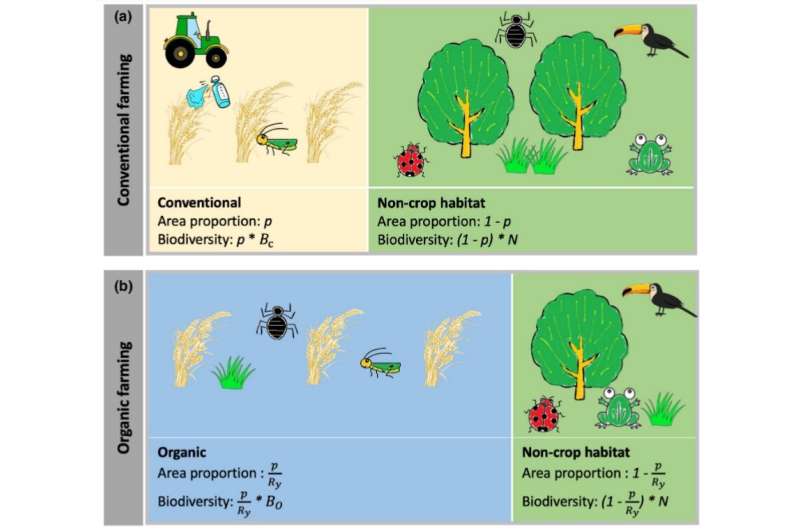Is organic farming always good for the environment? Researchers create strategy to help decide

Ensuring sufficient global food production and supply using sustainable methods is one of the most significant challenges we face this century.
Organic farming is seen as one potential solution to the increasing problem of decreasing biodiversity. However, lower yields have sparked a debate about whether organic farming is always the best use of land.
In a recent study, published in Ecology Letters, a team of researchers from Xi'an Jiaotong-Liverpool University, the University of Liverpool, University of Göttingen, Wageningen University, Center for Ecological Research, and China Agricultural University, developed a method to help farmers and policymakers decide if switching from conventional to organic farming will increase biodiversity while maintaining productivity.
This study is the first international meta-analysis that quantifies the trade-off between yield and biodiversity within the same land areas.
Dr. Yi Zou, who has been studying land use for many years and is the corresponding author of the study, says, "Our global meta-analysis of land use helps to identify the best strategy both for farmers and for the Earth."
Land sharing vs land sparing
Organic farming's need for extra land may cancel out the resulting biodiversity gains and has led to the discussion of "land sharing" vs "land sparing."
A member of the research team, Dr. Jenny Hodgson, explains: "In the land sparing strategy, the agricultural land is intensively used for high yielding agriculture to leave as much land as possible for conserving high biodiversity in natural lands.
"On the other hand, in the land sharing strategy, the agricultural land is managed extensively and kept biodiversity-friendly; however, more land is usually required for achieving the same total production as in intensive agriculture."
The researchers analyzed the yield and biodiversity of land in 75 international studies to calculate a threshold where the increase in biodiversity from organic farming and land sharing is advantageous despite the extra land it takes up.
Importantly, they show that the threshold depends on how much biodiversity is already present on the additional land that would be needed to grow crops to make up for lost yield.
Shanxing Gong, the first author of the study, says, "Our results show that, on average, a switch to organic farming would be a more effective strategy if the unfarmed lands are less than 2.4 times as biodiverse than the farmed lands. Of course, this value is context-dependent and varies from region to region.
"This provides us with useful insights for local decision-makers or local management strategies. A switch to organic farming and land-sharing is likely to be the optimal land use in regions with lower species richness in remaining non-crop habitats."
Crop variation
The study found that the impact of organic farming on biodiversity and yield is dependent on the species being measured and the crops being grown.
In cereal crops, such as oats, wheat, barley and maize, the overall loss of yield is similar to the gain in biodiversity after a switch to organic farming. In particular, there is a significant increase in the number of plant and invertebrate species, whereas birds were less affected.
In contrast, in non-cereal crops, such as coffee and vegetables, switching to organic farming shows no significant yield loss yet there is an increase in biodiversity.
This means certain types of produce can be organically farmed with no need for more land to achieve the same yield.
"Depending on the crop, there is a possibility of switching to organic farming for higher biodiversity gain with very little or no yield loss," says Dr. Zou. "In these conditions, switching to organic farming is a win-win situation."
The researchers stress that this threshold is only a guide, as other factors such as surrounding landscapes and variation of organic treatment can also affect the benefits of organic farming. For example, moderate-intensity fertilization of organic non-cereal crops may enhance both yield and biodiversity.
"Our study is just the start of understanding this trade-off. We need to incorporate other factors into the study such as the abundance of protected species, farmers' incomes, and vital ecosystem services such as pollination, carbon absorption, and soil protection," says Gong.
Dr. Zou adds that "we want to encourage more studies comparing yield and biodiversity trade-off in developing countries, as most existing studies have been collected in developed countries."
So is organic farming better? That depends—what are you trying to grow, and where are you trying to grow it?
More information: Shanxing Gong et al, Biodiversity and yield trade‐offs for organic farming, Ecology Letters (2022). DOI: 10.1111/ele.14017
Journal information: Ecology Letters
Provided by Xi'an jiaotong-Liverpool University




















